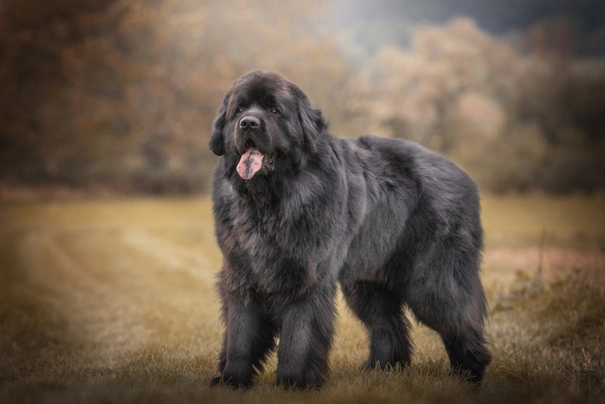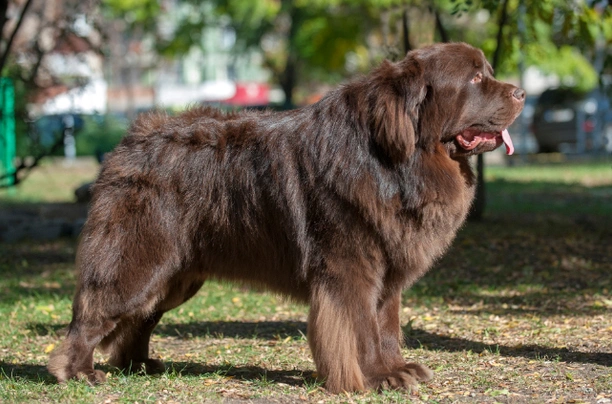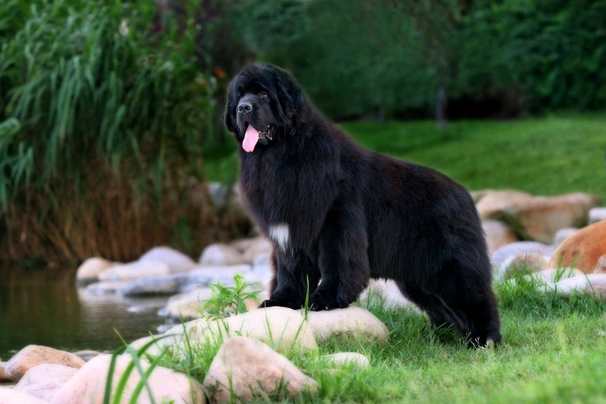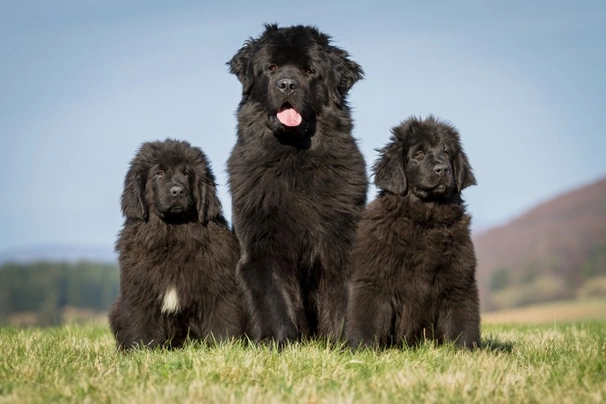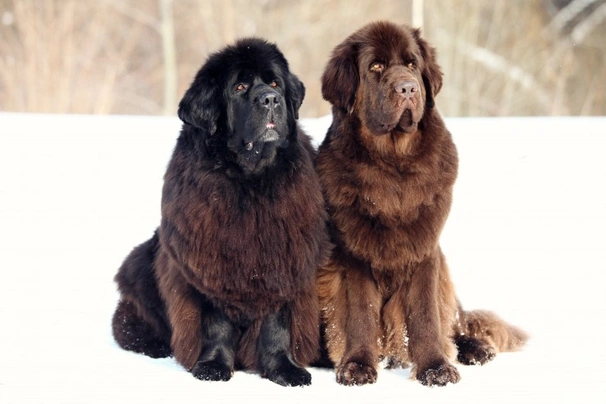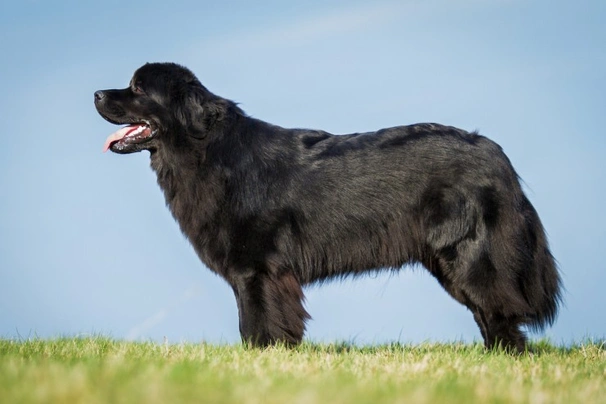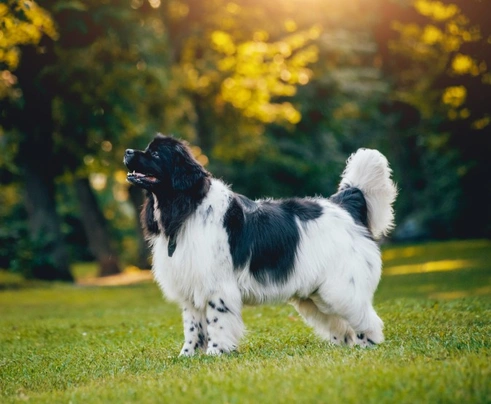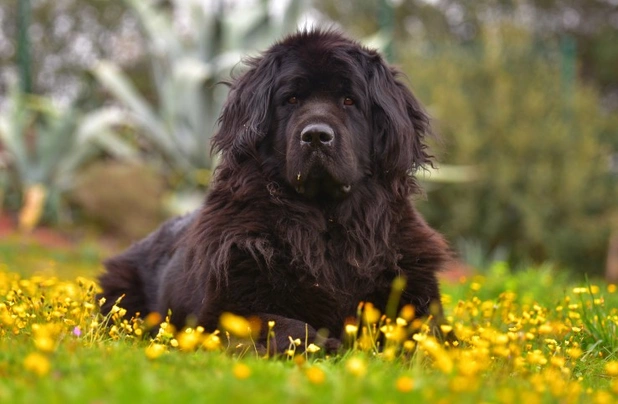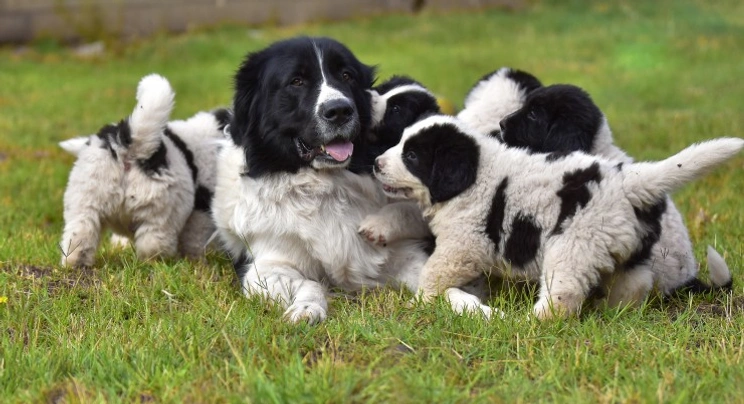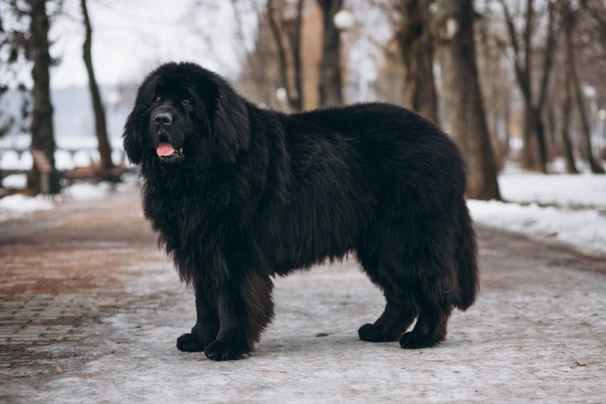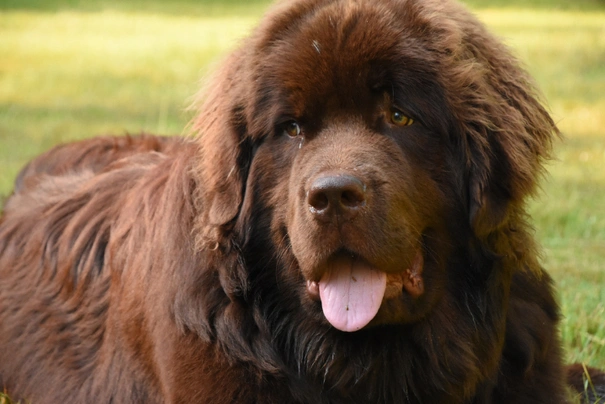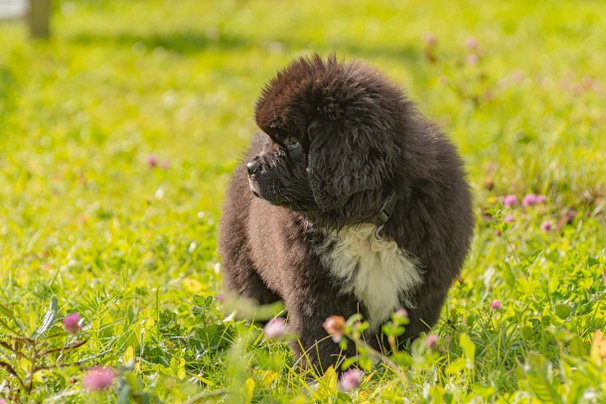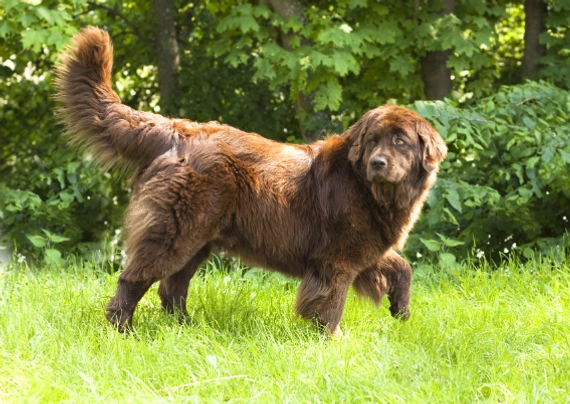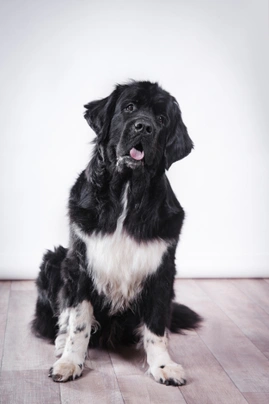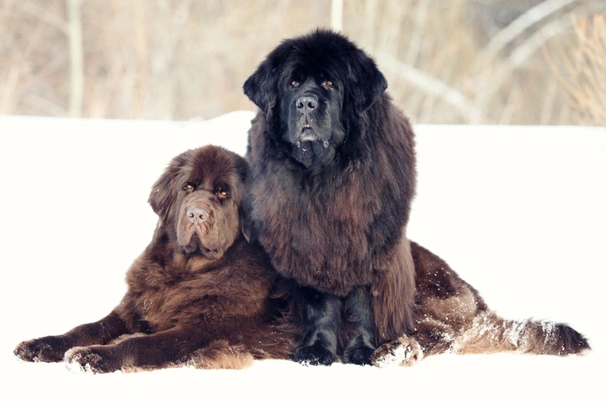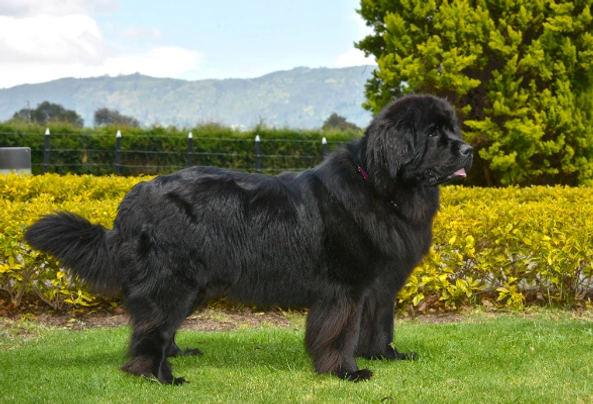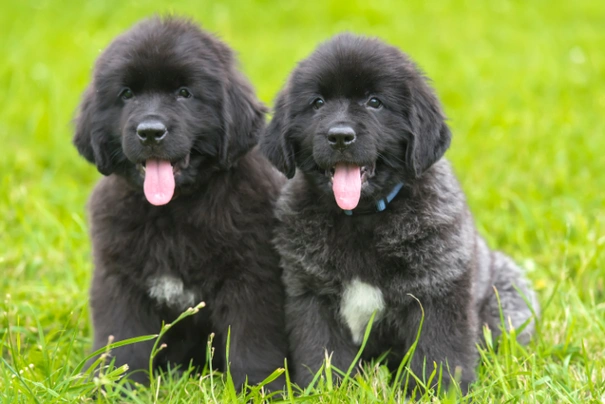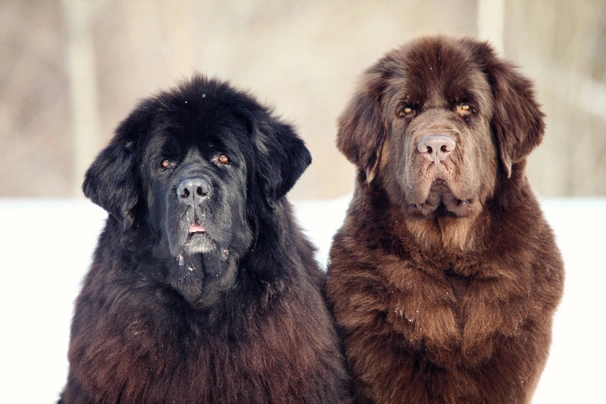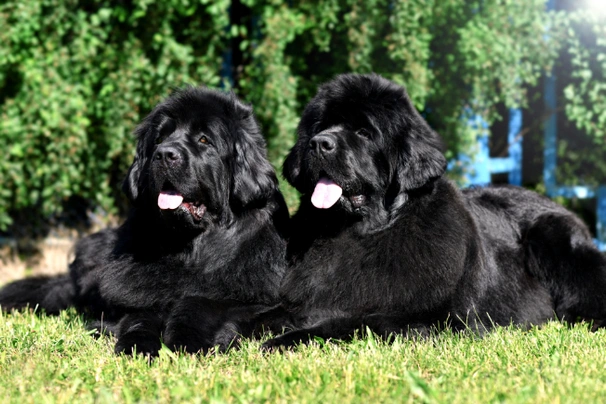Newfoundland
Pros
Cons
Introduction of the Newfoundland
The Newfoundland may be a very large dog but they are gentle giants renowned for their docile and kind natures. Always eager and willing to please these dogs are a great choice for people with families because the Newfoundland appears to have a real affinity with children liking nothing more than to play interactive games with them.
They boast wonderfully thick dense coats which take a bit of work when it comes to keeping them looking good. They also boast having webbed feet and are powerful swimmers. Newfoundlands need a lot of space and are not the ideal choice for people who live in apartments but they are a great choice for people who boast large and secure back gardens and who spend lots of time at home.
History of the Newfoundland
Legend has it that the Newfoundland is descended from the Black Bear which roams this region of Canada. However it is now almost certain that these large and impressive dogs are not native to Newfoundland but were developed over time by crossing many other large dog breeds including the St Bernard and English Mastiff with native Newfoundland breeds known as St John's Dogs. It is also thought the breed was developed by Portuguese fishermen during the 16th century.
There are those who believe that the breed came about by crossing native Indian dogs with European dogs that were introduced by explorers to the region as well as fishermen during the 15th Century and then afterwards too. However the bred came about the result was a large dog with webbed feet and thick dense coat that was capable of working in challenging conditions and water.
Originally there were two sizes namely the Greater Newfoundland and the Lesser Newfoundland which were also known as St John's Dogs and they were used to pull nets for local fishermen. The Greater Newfoundland being stronger and larger was also used to pull carts and other equipment.
As time passed a dog similar to the Newfoundland we know today started appearing on the scene and by the 1800's the breed's fame for being able to pull heavy loads and work alongside fishermen reached many people living in European countries. The dogs were soon taken to Europe where breeders started to produce exceptionally good examples of the Newfoundland.
In 1886 The Newfoundland Club was established here in the UK and remains the oldest club in Britain. A breed standard was set soon after which has basically not been changed to this day. Newfoundlands became popular in the UK at the beginning of the 20th century but the two World Wars saw their numbers fall. It was not until the 1950's that numbers began to rise again and the breed saw a renewed popularity.
Today the Newfoundland has become a popular choice with many people the world over whether as a companion dog or family pet thanks to their wonderfully kind natures and the fact they are real gentle giants around kids. However anyone wishing to share their home with a Newfoundland needs to know that thanks to their large size it costs quite a lot more to care and feed them than it does other breeds.
Interesting facts about the breed
- Is the Newfoundland a vulnerable breed? No they are among the most popular pets and companions in the UK
- They are one of the best "water dogs" in the world thanks to their deep broad chests thick water-resistant coats and webbed feet
- A Newfoundland can pull a drowning person to safety which makes them superb rescue dogs
- They are often called "nanny" dogs because they are so good around children of all ages
- The Newfoundland has throughout the ages been renowned for being real workhorses both on water and on land
- They have also become one of the most trustworthy dogs around children of all ages
Appearance of the Newfoundland
Height at the withers: Males 71 cm Females 66 cm
Average weight: Males 68 kg Females 54 kg
The Newfoundland is a well-balanced large dog that gives the impression of power and strength. They are proud and noble looking dogs that boast having a gentle expression about them especially in their eyes. Their heads are large and broad with a well-developed occipital bone but no definite stop. Their muzzles are clean cut and short being rather square and well covered in fine short hair.
Their eyes are quite small being dark brown in colour and set wide apart on a dog's face. Ears are set well back and small lying close to a dog's head and covered with short hair. Their mouths are soft and dogs boast a strong jaw with a perfect scissor bite where their upper teeth neatly overlap their lower ones. Necks are well set on the shoulders and strong with perfectly straight well-muscled front legs.
A Newfoundland has a strong nicely ribbed body with a broad and level topline and muscular strong loins. Their chest is deep and quite wide and their hindquarters are very well developed and strong. Back legs are well muscled and powerful. Their feet are large and webbed which is a physical trait that makes the Newfoundland such a strong swimmer. Tails are moderately long and fairly thick being well covered in hair. When at rest their tail hangs down but when a Newfoundland is on the move they carry their tail slightly up or straight out with a hint of a curve right at the tip.
When it comes to their coat the Newfoundland boasts having a double flat coat that is dense and quite coarse to the touch. Their coat is also quite oily and therefore extremely water-resistant. When their coat is brushed the wrong way the hair naturally falls back into place. Their front legs are nicely feathered whereas their back legs are also slightly feathered. The accepted colours for breed registration are as follows:
- Black
- Black & White
- Brown
- Brown & White
- Grey
- Landseer
- White & Black
Gait/movement
When a Newfoundland moves they do so with a free almost rolling gait. Some dog's toes turn slightly inwards when they move which is acceptable under the breed standard.
Faults
The Kennel Club frowns on any sort of exaggerations or departures of the breed standard and would judge any faults on how much they affect a Newfoundland's overall health and wellbeing as well as their ability to perform.
A male's testicles should both be fully descended into a dog's scrotum and it is worth noting that a Newfoundland can be a little shorter or taller and they can be slightly heavier or lighter than stated in the Kennel Club breed standard which is given in a guideline only.
Temperament of the Newfoundland
Newfoundlands are renowned for their kind and calm natures. However they are not the best choice for first time owners because these dogs need to be handled and trained by someone who is familiar with the breed or this type of very large and intelligent dog.
Newfoundlands also have quite a unique and musky odour about them which some people might not be able to live with. They are known to dribble and slobber quite a lot too which is something else that owners might not be able to cope with. Their training and education has to start from a young age and puppies need to be well socialised which means introducing them to as many new situations people dogs and other animals as soon as they have been fully vaccinated for them to mature into well-rounded adult dogs.
They are known to be quite sensitive by nature and therefore care has to be taken when training a puppy or young dog because any heavy-handed treatment would not achieve very good results. They thrive in a calm environment where they have lots of space to express themselves. With this in mind a Newfoundland is the ideal choice of dog for people who are familiar with the breed and who boast large secure back gardens for their pets to romp around in as often as possible.
Are they a good choice for first time owners?
Newfoundlands are a good choice for first time dog owners providing they have enough time to dedicate to such a large and loving canine companion. They are particularly good with young children and older people too although playtime can get a bit boisterous at times which is why any interaction between such a large dog and children should always be well supervised.
What about prey drive?
Newfoundlands are very social by nature and as such they do not have a very high prey drive typically being good around other animals they meet which is why they have earned themselves a reputation for being so trustworthy and reliable.
What about playfulness?
Newfoundlands have a very playful side to their natures and love to entertain and be entertained albeit it slowly at times because they like to take their time about things which includes playing any sort of interactive game.
What about adaptability?
Newfoundlands being such large dogs are better suited to living in houses rather than apartments because they need enough room to express themselves as they should and ideally in homes with large secure back gardens that dogs can roam in as often as possible bearing in mind that Newfoundlands do not do well in hotter weather thanks to their thick dense coats.
What about separation anxiety?
Newfoundlands form strong ties with their families and dogs are never very happy when they find themselves left on their own for longer periods of time. They are better suited to people who either work from home or in households where one person stays at home when everyone else is out so they are never alone for any length of time which could see a dog suffering from separation anxiety. This can lead to them being destructive around the home which is a dog's way of relieving any stress they are feeling and a way to keep themselves entertained.
What about excessive barking?
Newfoundlands are not known to be "barkers" and will only bark when necessary and not just for the sake of it. With this said any dog when left on their own for longer periods of time might start barking incessantly as a way of getting some attention and to show how unhappy they are at the situation.
Do Newfoundlands like water?
Newfoundlands love swimming and will take to the water whenever they can being natural and excellent water dogs. With this said care should always be taken when walking a Newfoundland off the lead anywhere near more dangerous watercourses just in case a dog decides to leap in and then needs rescuing.
Are Newfoundlands good watchdogs?
Newfoundlands are not natural watchdogs although this is not to say a dog would not be quick off the mark to let an owner know when there are strangers about although they would rarely do this aggressively because it is just not in the nature to show any sort of vicious behaviour.
Intelligence / Trainability of the Newfoundland
Newfies are intelligent and as such in the right hands they are easy to train. With this said their training and education must start as early as possible and it's crucial that puppies be well socialised from a young age for them to mature into well-rounded dogs. These large dogs do not respond well to any sort of harsh training or correction they do answer well to positive reinforcement training methods that are always fair and given by people in a calm way.
Newfoundlands also need to be given lots of mental stimulation for them to be truly happy well-rounded dogs because if left to their own devices such a large dog will start to find their own ways of entertaining themselves which includes being destructive around the home.
Newfoundland puppies are very cute looking but it's important to remember they grow into large and powerful mature dogs which means their education must start as early as possible so they understand what is expected of them from an early age. All dogs like to have boundaries and limits with some of them liking to test these from time to time. Newfoundlands are gentle even though boisterous when puppies and they need to be given the right sort of gentle direction from the word go. The first commands a puppy should be taught are as follows:
- Come
- Sit
- Stay
- Quiet
- Leave it
- Down
- Bed
Children and other
As previously mentioned Newfies are real gentle giant and rarely would one of these dogs show any sort of aggressive behaviour. They thrive on being around people and in a family environment having a real affinity with children. However their size alone can pose a bit of a problem to toddlers and younger children so it's important for any interaction between the two to be well supervised.
Newfoundlands are usually good around other dogs but unless a dog has grown up with a family cat in the home but care needs to be taken when a Newfie meets or sees another cat. It's best to avoid any contact between smaller pets and a Newfoundland even if they have grown up together just in case even though they are known to be one of the friendliest breeds on the planet.
Health of the Newfoundland
The average life expectancy of a Newfoundland is between 8 and 10 years when properly cared for and fed an appropriate good quality diet to suit their ages.
Like so many other breeds the Newfie is known to suffer from a few hereditary health issues which are worth knowing about if you are planning share your home with one of these active and handsome dogs. The conditions that seem to affect the breed the most include the following:
- Elbow Dysplasia - testing available
- Hip Dysplasia - stud dogs must be hip scored
- Cystinuria - DNA test available
- Subvalvular Aortic Stenosis (SAS) - Test available
- Ciliary Dyskinesia
- Eye issues
More about Sub-aortic stenosis (SAS)
The Newfoundland is known to suffer from SAS which sees blood flow partially obstructed in a dog's heart because of scar tissue found just below the aortic valve. As a result the left side of the heart has to work that much harder to pump blood through and this causes the muscle wall to become thicker. If the wall becomes too thick blood flow is so negatively impacted that not enough valuable oxygen is pumped through a dog's system which in a worst-case scenario can cause sudden death.
- Grading for heart murmurs is as follows:
- Grade 0/6 - No murmur detected
- Grade 1/6 - Murmur is very difficult to hear
- Grade 2/6 - A quiet murmur can be detected with a stethoscope
- Grade 3/6 - Murmur is progressively louder
- Grade 6/6 -Murmur can be heard without the use of a stethoscope
More about Cystinuria
Normally the amino acid called cystine is absorbed in a dog's small intestine once it has been filtered through their kidneys after which time it is reabsorbed into their blood stream. However if a dog has any tubules in their kidneys the cystine is not reabsorbed but passed into their urine instead and this causes the formation of crystals in a dog's bladder their kidneys or ureters. It is an autosomal recessive inherited disorder which in short means both parents can pass the condition on to their offspring with puppies having to inherit 2 mutant genes from each of them.
In Newfoundlands puppies as young as 5 months old start to show signs of there being something wrong and both males and females can be affected although because in male dogs the ureter is narrower males tend to be more quickly affected and more severely affected than their female counterparts. All breeding dogs must be tested before being used for breeding purposes.
What about vaccinations?
Newfoundland puppies would have been given their initial vaccinations before being sold but it is up to their new owners to make sure they have their follow-up shots in a timely manner with the vaccination schedule for puppies being as follows:
10 -12 weeks old bearing in mind that a puppy would not have full protection straight away but would be fully protected 2 weeks after they have had their second vaccination
There has been a lot of discussion about the need for dogs to have boosters. As such it's best to talk to a vet before making a final decision on whether a dog should continue to have annual vaccinations which are known as boosters.
What about spaying and neutering?
A lot of vets these days recommend waiting until dogs are slightly older before spaying and neutering them which means they are more mature before undergoing the procedures. As such they advise neutering males and spaying females when they are between the ages of 6 to 9 months old. Other vets recommend spaying and neutering dogs when they are 6 months old but never any earlier unless it is for medical reasons.
What about obesity problems?
Some Newfoundlands gain weight after they have been spayed or neutered and it's important to keep an eye on a dog's waistline just in case they do. If a dog starts to put on weight it's important to adjust their daily calorie intake and to up the amount of exercise they are given. Older Newfoundlands too are more prone to gaining weight and again it's essential they be fed and exercised accordingly because obesity can shorten a dog's life by several years. The reason being that it puts a lot of extra strain on a dog's internal organs including the heart which has to work that much harder to pump blood through it bearing in mind that Newfoundlands are already known to be prone to life threatening heart issues.
What about allergies?
Newfoundlands are prone to suffering from allergies and it's important for a dog to see a vet sooner rather than later if one flares up. Allergies can be notoriously hard to clear up and finding the triggers can be challenging. With this said a vet would be able to make a dog with an allergy more comfortable while they try to find out the triggers which could include the following:
- Certain foods
- Airborne pollens
- Dust mites
- Environment
- Flea and tick bites
- Chemicals found in everyday household cleaning products
Participating in health schemes
All responsible Newfoundland breeders would ensure that their stud dogs are tested for known hereditary and congenital health issues known to affect the breed by using the following schemes:
- BVA/KC Hip Dysplasia Scheme
- DNA test -Cystinuria(CU)
- BVA/KC Elbow Dysplasia Scheme
- Breed Club - Heart testing
- Cystinuria - DNA test
What about breed specific breeding restrictions?
Apart from the standard breeding restrictions for all Kennel Club registered breeds there are no other breed specific breeding restrictions for the Newfoundland.
What about Assured Breeder Requirements?
It is mandatory for all Kennel Club Assured Breeders to have stud dogs tested using the following schemes and the Kennel Club strongly advises that all other breeders follow suit to ensure the continued good health of the breed:
The Kennel Club also strongly recommends that all breeders use the following schemes and follow this advise when breeding Newfoundlands:
- Breed Club - Heart testing
- Bitches should not to produce a litter when they are under the age of 2
- Bitches over that are over the age of 7 should not produce a litter
Caring for the Newfoundland
As with any other breed Newfies need to be groomed on a regular basis to make sure their coats and skin are kept in top condition. They also need to be given regular daily exercise to ensure they remain fit and healthy. On top of this dogs need to be fed good quality food that meets all their nutritional needs throughout their lives.
Caring for aNewfoundland puppy
Newfoundland puppies are boisterous and full of life which means it's essential for homes and gardens to be puppy-proofed well in advance of their arrival. A responsible breeder would have well socialised their puppies which always leads to more outgoing confident and friendly dogs right from the word go. With this said any puppy is going to feel vulnerable when they leave their mother and littermates which must be taken into account. The longer a puppy can remain with their mother the better although it should never be for too long either.
It's best to arrange to pick puppy up when people in the home are going to be around for the first week or so which is the time needed for a puppy to settle in. Puppy-proofing the home and garden means putting away any tools and other implements that a boisterous puppy might injure themselves on. Electric wires and cables must be put out of their reach because puppies love chewing on things. Toxic plants should be removed from flowerbeds and the home too.
Puppies need to sleep a lot to grow and develop as they should which means setting up a quiet area that's not too out of the way means they can retreat to it when they want to nap and it's important not to disturb them when they are sleeping. It's also a good idea to keep "playtime" nice and calm inside the house and to have a more active "playtime" outside in the garden which means puppies quickly learn to be less boisterous when they are inside.
The documentation a breeder provides for a puppy must have all the details of their worming date and the product used as well as the information relating to their microchip. It is essential for puppies to be wormed again keeping to a schedule which is as follows:
- Puppies should be wormed at 6 months old
- They need to be wormed again when they are 8 months old
- Puppies should be wormed when they are 10 months old
- They need to be wormed when they are 12 months old
Things you'll need for your puppy
There are certain items that new owners need to already have in the home prior to bringing a new puppy home. It's often a good idea to restrict how much space a puppy plays in more especially when you can't keep an eye on what they get up to bearing in mind that puppies are often quite boisterous which means investing in puppy gates or a large enough playpen that allows a puppy the room to express themselves while keeping them safe too. The items needed are therefore as follows:
- Good quality puppy or baby gates to fit on doors
- A good well-made playpen that's large enough for a puppy to play in so they can really express themselves as puppies like to do
- Lots of well-made toys which must include good quality chews suitable for puppies to gnaw on bearing in mind that a puppy will start teething anything from when they are 3 to 8 months old
- Good quality feed and water bowls which ideally should be ceramic rather than plastic or metal
- A grooming glove
- A slicker brush or soft bristle brush
- Dog specific toothpaste and a toothbrush
- Scissors with rounded ends
- Nail clippers
- Puppy shampoo and conditioner which must be specifically formulated for use on dogs
- A well-made dog collar or harness
- A couple of strong dog leads
- A well-made dog bed that's not too small or too big
- A well-made dog crate for use in the car and in the home that's large enough for a puppy to move around in
- Baby blankets to put in your puppy's crate and in their beds for when they want to nap or go to sleep at night
Keeping the noise down
All puppies are sensitive to noise including Newfoundland puppies. It's important to keep the noise levels down when a new puppy arrives in the home. TVs and music should not be played too loud which could end up stressing a small puppy out.
Keeping vet appointments
As previously mentioned Newfoundland puppies would have been given their first vaccinations by the breeders but they must have their follow up shots which is up to their new owners to organise. The vaccination schedule for puppies is as follows:
10 -12 weeks old bearing in mind that a puppy would not have full protection straight away but would only be fully protected 2 weeks after they have had their second vaccination
When it comes to boosters it's best to discuss these with a vet because there is a lot of debate about whether a dog really needs them after a certain time. However if a dog ever needed to go into kennels their vaccinations would need to be
What about older Newfoundlands when they reach their senior years?
Older Newfoundlands need lots of special care because as they reach their golden years they are more at risk of developing certain health concerns. Physically a Newfie will start to have a greying muzzle but there will be other noticeable changes too which includes the following:
- Coats become coarser
- A loss of muscle tone
- Newfoundlands can either become overweight or underweight
- They have reduced strength and stamina
- Older dogs have difficulty regulating their body temperature
- They often develop arthritis
- Immune systems do not work as efficiently as they once did which means dogs are more susceptible to infections
- Older dogs change mentally too which means their response time tends to be slower as such they develop the following:
- They respond less to external stimuli due to impaired vision or hearing
- They tend to be a little pickier about their food
- They have a lower pain threshold
- Become intolerant of any change
- Often an older dog can feel disorientated
Living with a Newfie in their golden years means taking on a few more responsibilities but these are easily managed and should include taking a look at their diet the amount of exercise they are given how often their dog beds need changing and keeping an eye on the condition of their teeth.
Older Newfoundlands need to be fed a good quality diet that meets their needs at this stage of their lives all the while keeping a close eye on a dog's weight. A rough feeding guide for older Newfies is as follows bearing in mind they should be fed highly digestible food that does not contain any additives:
- Protein content should be anything from 14 – 21%
- Fat content should be less than 10%
- Fibre content should be less than 4%
- Calcium content should be 0.5 – 0.8%
- Phosphorous content should be 0.4 – 0.7%
- Sodium content should be 0.2 – 0.4%
Older Newfies don't need to be given the same amount of daily exercise as a younger dog but they still need the right amount of physical activity to maintain muscle tone and to prevent a dog from putting on too much weight. All dogs need access to fresh clean water and this is especially true of older dogs when they reach their golden years because they are more at risk of developing kidney disorders.
Grooming of the Newfoundland
Newfoundlands are high maintenance when it comes to keeping their thick double coats in good condition. Their coats are naturally oily which means they are extremely water resistant as such they dry very quickly when a Newfie gets wet or has been swimming which these large dogs love to do. Their coats need to be brushed every day to prevent any tangles or matts forming paying special attention to the feathers on a dog's legs.
It is also a good idea to have a Newfie professionally groomed twice a year which means they get a good bath in the process. Being such large dogs it can be a real challenge to bath them at home. It's also important to check a dog's ears and to clean them when necessary. If too much wax builds up in a dog's ears it can lead to a painful infection which can be hard to clear up. In short prevention is often easier than cure when it comes to ear infections.
Exercise of the Newfoundland
Newfoundlands need to be given a minimum of 60 minutes exercise a day and they need lots of space to move around. Ideally a Newfie should be allowed to roam around a back garden as often as possible so they can really let off steam in a safe environment. With this said the fencing in a garden has to be very secure to keep such a large dog in.
Because of their thick oily double coats the Newfoundland suffers when the weather is warmer and therefore care should be taken when they are exercised. It's best to walk a dog earlier in the morning and then later in the afternoon when the sun is lower in the sky and the temperature is cooler. Care also must be taken when walking a Newfie anywhere near water because they love swimming and might just jump in no matter what the weather is doing or how safe it is for them to swim.
Young Newfie puppies should not be given too much exercise because their joints and bones are still growing and too much pressure on them could result in causing a dog a few problems later in their lives. They should not be allowed to jump up or down from the furniture or run up and down stairs because it puts too much pressure and strain on their growing joints and bones.
Feeding of the Newfoundland
If you get a Newfoundland puppy from a breeder they would give you a feeding schedule and it's important to stick to the same routine feeding the same puppy food to avoid any tummy upsets. You can change a puppy's diet but this needs to be done very gradually always making sure they don't develop any digestive upsets and if they do it's best to put them back on their original diet and to discuss things with the vet before attempting to change it again remembering that puppies need to be given a very nutritious diet for their bones and joints to develop as they should.
Older dogs are not known to be fussy or finicky eaters but this does not mean you can feed them a lower quality diet. It's best to feed a mature dog twice a day once in the morning and then again in the evening making sure it's good quality food that meets all their nutritional requirements. It's also important that dogs be given the right amount of exercise so they burn off any excess calories or they might gain too much weight which can lead to all sorts of health issues. Obesity can shorten a dog's life by several years so it's important to keep an eye on their waistline from the word go.
Feeding guide for a Newfoundland puppy
Puppies need to be fed a highly nutritious good quality diet for them to develop and grow as they should. As a rough guide a Newfoundland puppy can be fed the following amounts every day making sure their meals are evenly spread out throughout the day and it's best to feed them 3 or 4 times a day:
- 2 months old - 394g to 439g depending on puppy's build
- 3 months old - 504g to 580g depending on puppy's build
- 4 months old - 556g to 647g depending on puppy's build
- 5 months old - 658g to 771g depending on puppy's build
- 6 months old - 749g to 879g depending on puppy's build
- 7 months old - 756g to 892g depending on puppy's build
- 8 months old - 755g to 894g depending on puppy's build
- 9 months old - 701g to 878g depending on puppy's build
- 10 months old - 658g to 828g depending on puppy's build
- 11 months old - 613g to 774g depending on puppy's build
- 12 months old - 574g to 721g depending on puppy's build
- 13 months old - 538g to 677g depending on puppy's build
- 14 months old - 535g to 636g depending on puppy's build
Once a puppy is 18 months old they can be fed adult dog food.
Feeding guide for an adult Newfoundland
Once fully mature an adult Newfoundland must be fed a good quality diet to ensure their continued good health. As a rough guide an adult Newfie can be fed the following amounts every day:
- Dogs weighing 54kg can be fed 458g to 603g depending on activity
- Dogs weighing 60kg can be fed 519g to 683g depending on activity
- Dogs weighing 68kg can be fed 578g to 761g depending on activity
Newfoundland price
If you are looking to buy a Newfoundland you would need to pay anything from £800 to over £1000 for a well-bred pedigree puppy. The cost of insuring a male 3-year-old Newfie in northern England would be £59.29 a month for basic cover but for a lifetime policy this would set you back £106.86 a month (quote as of October 2017). When insurance companies calculate a pet's premium they factor in several things which includes where you live in the UK and a dog's age and whether they have been neutered or spayed.
When it comes to food costs you need to buy the best quality food whether wet or dry to feed your dog throughout their lives making sure it suits the different stages of their lives. This would set you back between £70 - £100 a month. On top of this you would need to factor in veterinary costs if you want to share your home with a Newfie and this includes their initial vaccinations their annual boosters the cost of neutering or spaying your dog when the time is right and their yearly health checks all of which quickly adds up to over a £1600 a year.
As a rough guide the average cost to keep and care for a Newfoundland would be between £140 to £220 a month depending on the level of insurance cover you opt to buy for your dog but this does not include the initial cost of buying a well-bred healthy Kennel Club registered pedigree puppy.
Buying advice
When visiting and buying any puppy or dog there are many important things to consider and questions to ask of the breeder/seller. You can read our generic puppy/dog advice here which includes making sure you see the puppy with its mother and to verify that the dog has been wormed and microchipped.
Newfoundlands are an extremely popular breed both in the UK and elsewhere in the world which means that well-bred puppies command a lot of money. As such with Newfoundlands there is specific advice questions and protocols to follow when buying a puppy which are as follows:
- Beware of online scams and how to avoid them. You may see online and other adverts by scammers showing images of beautiful Newfoundlandpuppies for sale at very low prices. However the sellers ask buyers for money up front before agreeing to deliver a puppy to a new home. Potential buyers should never buy a puppy unseen and should never pay a deposit or any other money online to a seller. You should always visit the pet at the sellers home to confirm they are genuine and make a note of their address.
- As previously touched upon Newfoundland are among the most popular breeds in the UK. As such there are many amateur breeders/people who breed from Newfoundlands far too often so they can make a quick profit without caring for the welfare of the puppies their dam or the breed in general. Under Kennel Club rules a dam can only produce 4 litters and she must be between a certain age to do so. Anyone wishing to buy a Newfoundland puppy should think very carefully about who they purchase their puppy from and should always ask to see the relevant paperwork pertaining to a puppy's lineage their vaccinations and their microchipping.

Newfoundland Girl
£800
Pedigree Newfoundland Female Puppy READY NOW
£2,000
